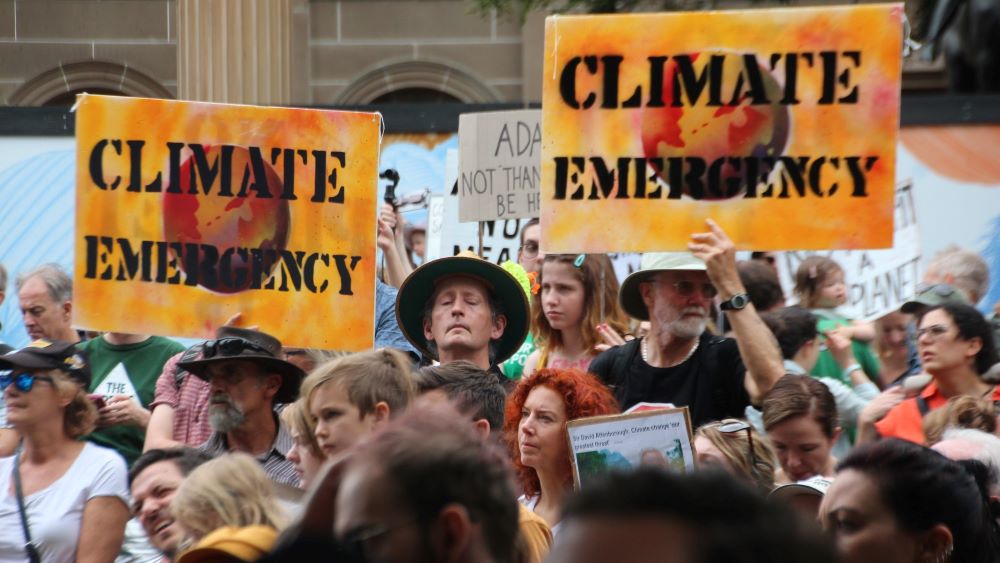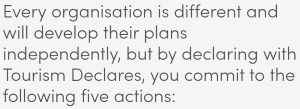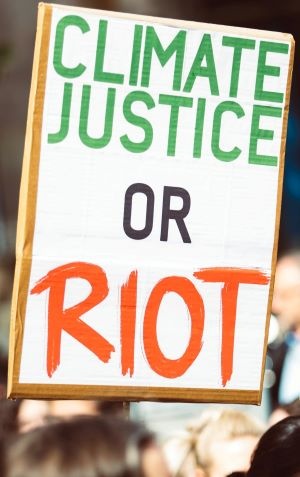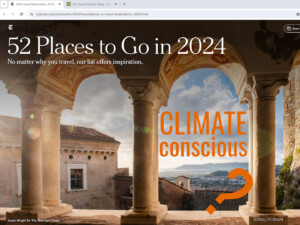Signatories to Tourism Declares Climate Emergency on “system change”, “regulatory action”

Climate change is real. How do we respond?
The first four points in the Tourism Declares Climate Emergency declaration are personal undertakings or organisational commitments to plan and to change and to share and to collaborate in relation to a signatory’s declaration of climate emergency.
All power to them!
However the fifth point in the declaration is “an unconscionable abdication of responsibility and a lack of consideration for fellow tourism stakeholders”, according to your correspondent in a recent post about tourism and the reality of climate change.
Why the harsh description? Because the fifth compels signatories to call for unspecified regulatory intervention in the air travel sector, which is likely to also impact aviation-dependent destinations. And “system change across the industry”, whatever that means, presumably has consequences for everyone.
Here is that fifth point Tourism Declares signatories commit to (along with the preamble and the submission):



In case “unconscionable abdication …” was unfair, and to better understand what “system change” and “urgent regulatory action” means to signatories, your correspondent reached out via LinkedIn to the bosses of several of the signatory organisations as well as a few of the individuals.
Among those contacted were the instigators of Tourism Declares: Much Better Adventures CEO Alex Narracott and author & editor Jeremy Smith.
Your correspondent asked everyone the same two questions pertaining to point 5 of the Tourism Declares declaration — What do you think “system change” means? And what specific “urgent regulatory action” will you be calling for? Your correspondent invited written responses via email.
Thank you very much to those who responded. You will find that I have copied and pasted your answers in good faith. Supplementary questions and answers [and additional information in square brackets] have been included where appropriate. And, where requested or offered, fast replies have been wholly replaced with more considered answers received later.
Except for the joint response by Tourism Declares’ co-founders, which is last, the responses that follow are in order of receipt:
Jared Meyers, Chairman, Legacy Vacation Resorts (USA)
JM: Systems change is needed because the current system incentivizes behavior which contributes to our climate emergency rather than fixing it. We need a price on carbon to move society away from fossil fuels and towards renewable energy sources. This will also contribute toward investment in cleaner energy technologies and decarbonization.

Additionally, shareholder primacy among businesses gets in the way of full stakeholder orientation so the environment is not considered at the same level as the shareholder. To protect our natural systems, they must have rights and also be considered when businesses make their decisions.
DG: So what regulatory action will you be calling for to change the current system?
JM: We are working with Ceres [a sustainability not-for-profit] to put a price on carbon. This would require federal regulation.
Regulation is not the primary means that we seek for positive impact. As a contributor to the business for good movement through conscious capitalism and B Corps [“business that balances purpose and profit” according to the US-based not-for-profit B Lab], we support transparent and credible action towards an inclusive, equitable and regenerative society. Many businesses are doing this and we use their success to inspire other businesses to follow. In some instances, government is creating policy and regulation based on the proof that business can balance profit and purpose in a way that promotes a shared prosperity.
Personally, I am aware that we have limited time to make enormous change and regulations and policies must be part of the solution. But regulation isn’t our chosen path to effect necessary climate change. We first look to our own practices, our suppliers, our employees and even how we can educate and mobilize our guests to use the power of their purchases to create the world they seek. We support climate based voting and making it easier for all employees to vote through the Time to Vote campaign and Business for America. We would like to see all businesses adopt the legal framework of being a benefit corporation but have not sought to regulate it. If there was a push among regulators for businesses to adopt benefit corporation commitments, we would support.
So specific to your question, the only regulation we actively support and assist relates to carbon pricing. The most recent bill that we supported related to the Energy Innovation Act. I hope this clarifies things for you related to how we seek to be a force for positive change.
Mark Wright, MD & Founder, The Adventure Connection (UK)
MW: I am a passionate advocate of the Tourism Declares movement and am doing everything I can on a personal and company level to drive change.
What do I think system change means?
I have been investigating this on several levels. The use of fossil fuels is very deeply embedded in our society (and around much of the world). For instance, the current ‘system’ around the aviation sector is highly organized on a worldwide basis for efficiency. This efficiency allows for thousands of tonnes of fuel to reach airports, and then be loaded into planes and burned by the time it reaches its destination. A Boeing 777 for instance, burns 135,000 tonnes as it flies to its destination. This halves the weight of the plane by the time it reaches its destination. The other half is left in the atmosphere. And there are around 100,000 flights every day.

I do not want people to stop flying. I want things to change so that airlines are forced to find cleaner ways of flying so that carbon emissions are reduced. Or for new disruptors to come in and develop completely new ways of tackling this issue.
At the moment, there appears to be no vision coming from the aviation industry for a future alternative. Why would they change? There has been 70 or so years of investment in developing the infrastructure they now have in place and every minute lost and every cent lost in efficiency is precious to them.
Pressure needs to come from government to FORCE change. I do not have the answer yet as to what this should be or when it should be achievable by. But I’d like to hear governments (and the industry) publishing their vision for the future. E.g. no permission to take off or land by say 2050 unless x% of fuel is renewable/clean.
So system change means: top down change by government putting deadlines in place (similar to the initiatives on phasing out petrol and diesel cars). Followed by massive infrastructure and engineering changes to meet deadlines and objectives set by governments. And this has to be worldwide. It’s a worldwide problem so there needs to be worldwide co-operation. A very tough challenge I know, but one which we have to face up to.
Urgent action is needed on:
- Not allowing older, inefficient planes to be used (this needs to be done internationally, probably by ICAO, not just in the UK).
- Adopt a duty, similar to the UK’s Air Passenger Duty, at an increased level sufficient to reduce demand (e.g. The Green Flying Duty). The revenues should then be ring-fenced for investment into R&D for electric planes as well as railway improvements.
- There is currently no tax or VAT on aviation fuel. It is heavily subsidised. This makes little sense for an industry which pollutes so heavily. In my view, the aviation industry must reduce its fair share of emissions if we are to reach our global targets. It is time for the airline industry to step up and play its part in a greener future for travel. And the financial pressures and reduced demand which this causes the airlines and aviation manufacturers, just might be enough to encourage more investment into developing cleaner ways of flying.
- Push for retraction of the Chicago Convention agreement under which “members of the International Civil Aviation Organisation (ICAO), including the United Kingdom, are prevented from taxing international aviation fuel, or any proxies for fuel.
Willem Neimeijer, Founder, Khiri Travel (Thailand)
WN: The industry needs some clear standards when it comes to carbon offset and measuring the carbon footprint of client travel. Only then can we see a systemic change. At the moment it’s a bit of a free for all — with wildly differentiating numbers. So that is what we mean with some sort of regulatory action — perhaps the oversight by a neutral industry organizations such as PATA or GSTC?
Karen Simmonds, Founder, Travel Matters (UK)
KS: It is because of the growth in tourism/travel and our reliance on fossil fuels in maritime and aviation that there needs to be a system change. The industry needs to swap this reliance on fossil fuel and invest in cleaner fuel/renewable energy. The system change can come from governments taxing the revenue and use the levy/tax to invest in more research as we are very much up against the clock.

It’s not just about considering our default behaviour and passion for flying around the globe and how we reduce our carbon in our travel choices, we have to consider the energy we use in our homes. Can we reduce the carbon through measures such as insulation and better energy efficiency of our appliances, setting temperature gauges lower, improving our heat or cooling systems? We know we can reduce carbon by looking at what we eat and reduce our food waste.
I’d be in favour of a carbon tax levy – it would be a good place to start. Businesses or individuals who travel frequently would contribute the most. I think this would be a fair solution. The polluters should be paying more for research.
Governments should be listening more to the voices of the environmentalists and those keen on social justice. Individually, we all have a responsibility to lobby, educate and be heard before it is too late.
Justin Francis, Founder and CEO, Responsible Travel (UK)
JF: [link]
[The link Mr Francis sent by way of a reply was to Responsible Travel’s (RT’s) “manifesto for the future of tourism”. The document demonstrates that RT have thought this through in some depth. And there are echoes of it in other signatories’ responses.
The manifesto discusses how aviation fuel is not taxed the same as other transport fuels and that R&D efforts toward low and zero emission aircraft need more support. RT therefore proposes “a new global tax on aviation (based on a reformed version of the UK’s APD [Air Passenger Duty]) that will be ring-fenced for Research and Development (R&D) in electric aviation and to improve railway connectivity”.
Per the manifesto, “RT” wants to:
- Increase APD in the UK.
- Rename it the Green Flying Duty (GFD).
- Ring-fence GFD revenues for R&D in electric planes and to improve railway connectivity.
- Ensure that GFD reduces the demand for aviation until electric planes can handle it.
- Encourage national governments to roll out GFD globally.
- Make GFD higher than APD and fairer (higher classes pay more; private jets pay most) and even higher again for domestic flights.
There was no response by JF to a follow-up question hence all this square-bracket exposition.]
Vicky Smith, Founder, Earth Changers (UK)
VS: I agree system change is required. Tourism is currently completely geared to volume, not value, which results in additional carbon emissions: Tourist boards are given quantitative targets by national governments rather than qualitative measures (such as visitor satisfaction, host Happiness — such as Bhutan), which cascade down to commercial organisations’ pursuit of volume and profit over social consideration, cultural preservation or environmental conservation. And so we end up with budget airlines, huge cruise ships and home rental networks, often making destinations uncomfortable places to be, whether through overtourism, pollution, or loss of local population and sense of place.

The whole Purpose of tourism requires a rethink — to be a force for good and sustainable development, not degradation — which is why I created Earth Changers. All tourism, given its known 10% of global jobs as much as 10% GDP, should consider social-environmental impacts too, including climate.
As for regulatory action — when consumers are incentivised to choose higher carbon-impacting transport options by the volume-not-value low cost approach above, we end up with unnecessary emissions. If fair and equal tax were applied to aviation jet fuel as car petrol, it would not only hamper unnecessary ‘spontaneous’ demand, but if those tax revenues were committed to carbon-friendly travel development (be it R&D in alternative synthetic fuels as required in the next 7 years, from the global climate Think Tank I’ve just participated in, or indeed development and/or subsidy of rail networks, then we can start to shift the mass travelling pubic to less carbon intensive means of transport. Additionally, aviation emissions should be included in Nationally Determined Contributions for, and any new transport infrastructure developments made in line with, the Paris Agreement.
Saskia Griep, Founder & CEO, Better Places Travel (Netherlands)
SG: What we mean by system change, is that all actors need to work together to change to a more sustainable tourism industry. This means as much business owners and travel agencies, as it does customers and the government. We all need to strive to do better, and only by working together will we accomplish the real and all-encompassing change that is necessary — where we value authentic experiences more than ticking off a bucket list, where we fly less and travel for longer, where the money spent in tourism reaches the locals directly, and where governments are doing their bit to ensure easier and safe modes of public transport and a level playing field for train/buses and planes in terms of taxation. Leading from that, one urgent regulatory action we have long supported and will continue to passionately advocate for is the introduction of fair taxation on airlines fuels and tickets. It just doesn’t make sense that it is so disproportionally cheaper to fly than to take the train on mainland Europe, and a lot of that can be traced back to unfair taxation.
Jeremy Smith, author & editor (UK)
JS, on behalf of himself and his Tourism Declares co-founder Alex Narracott, CEO of Much Better Adventures (UK):
The climate emergency is caused by the way our economic system operates. We therefore need to change the system to fix the problem. As Forum for the Future writes in their excellent explanation of system change: “Systemic change is where relationships between different aspects of the system have changed towards new outcomes and goals. And it’s driven by transformational, not incremental change.”
We haven’t set an arbitrary goal. Our goal is the one defined by the world’s top climate scientists, and this is why our central commitment is to “accept current IPCC advice stating the need to cut global carbon emissions to 55% below 2017 levels by 2030 to keep the planet within 1.5 degrees of warming.” This is why all our signatories commit to ensuring their “Climate Emergency Plan represents actions designed to achieve this.”

However fast the businesses and organisations declaring with us might act, we believe they will be able to change faster if they are supported by the right regulations and government incentives. We saw last week the impact “urgent regulatory action” can have on the growth in aviation emissions, with the UK appeal court’s decision not to allow a third runway to be built at Heathrow because it was not in line with the government’s commitment to the Paris Climate Agreement’s target of keeping global temperature rise as close to 1.5C as possible.
There are other regulatory mechanisms that might further accelerate this transition, such as proposals for a Frequent Flyer Levy [PDF], a socially progressive tax framework that has been supported by the likes of the UK Net-Zero Advisory Group to the Committee on Climate Change [PDF].
Beyond this though, we deliberately don’t have a specific set of policies for system change laid out, as we have only been operational a few weeks. We are focussed on creating the momentum for our industry to find the answers together.
My take
Rest easy. There are no Reds under the bed. There is no big-government conspiracy to take over travel & tourism or to tax it into oblivion — not intentionally, anyway! But the road to hell is paved with intentions — good, bad, and indifferent.
“System (or systemic) change” sounds okay when couched in terms of incentives, but any vicious dictator worth the label knows how to use incentives. Consign three generations of a dissident’s family to a prison work camp and the dissident’s followers soon fall in line. Their incentive is very clear indeed.
Hyperbole aside, my only point here is that the vagaries of vagueness mean that we have to be vigilant. What exactly are all these people and organisations (75 at writing) think they are signing up to? Hence this post.
Happily, there is a lot less fluff, more specificity, and more common ground in the responses above than your correspondent suspected there might be. Interestingly, there are plenty of echoes of Justin Francis’ RT manifesto, such as the call for fair tax treatment across all fossil fuels regardless of their purpose. Sounds fair.
But even in such a small sample size there are differences that may lead to schism in future. Therefore Tourism Declares’ founders would do well to do away with the vague old fifth altogether, or at least attempt to weave the signatories’ most common threads into a new 5). The extant signatories might then reaffirm their declaration (or not) and at least prospective signatories will know what it is they are committing to.
A democratic mechanism for updating the declaration might be a useful feature, if not a required one, for keeping tabs on PESTs (political, economic, social and technological changes) and the evolving science. In doing that Tourism Declares could position itself as a more inclusive answer to or companion for SUNx’s invitation-only policy think tank.
Oh, and your correspondent reckons Tourism Declares’ logo of lost luggage needs a rethink … But to each their own.

Featured image (top of post): Climate Emergency. Melbourne climate march for our future. By John Englart (CC BY-SA 2.0) via Flickr.
Afterword
Despite your correspondent’s encouragement to think about and supply written answers, one signatory (not necessarily featured in this post) wanted to preview what “GT” would use before publishing! They said it was because it was not yet clear in their mind. Calling for “system change” and “urgent regulatory action” in such a confused state is surely as irresponsible as doing so with blind certainty.
Another signatory (not necessarily featured) responded immediately on LinkedIn with something about a global “need for a systems-based shift away from an “ego-system awareness” to an “eco-system awareness” for systems change”. Apparently that involves becoming less “ego-centric” and more “eco-centric”. Uh, okay. Your correspondent suggested they think about it and email a response.
Yet another signatory (not necessarily featured) suggested that I ask the two founders what the fifth means because they wrote it. Well, of course I asked the authors. However, is it not interesting to find out what the signatories thought it meant when they committed to the vagueness?
Your correspondent suspects that some of the signatories felt that declaring climate emergency and committing to the fifth was the right thing to do but perhaps didn’t think it through. And then when asked about it had a … minor panic?
As someone who also feels, and who is often wracked with self-doubt and uncertainty and anxiety, your correspondent understands and relates to this predicament very well. Your correspondent gets mad butterflies every time he publishes an opinionated post, fearing that there will be those in the industry who will shun him for playing Devil’s advocate or for blowing smoke into their echo chambers. And, unless it is merely paranoia on your correspondent’s part, some shunning already appears to be happening. If that is indeed the case, then those people should know that they are giving cold shoulder to an ally and prospective partner.
In any case, just as your correspondent enjoys playing Devil’s advocate and is always open to changing his mind — and does so regularly on a range of nuanced issues — “GT” is open to both orthodox and heterodox ideas on anything travel & tourism-related. For those who would like to share their unique perspective on what does, could, or should make tourism good, please download the “GT” Insight guidelines.
And if you would like yours truly to continue to risk offending — without ever setting out to offend — you may support me privately and anonymously. Please …





